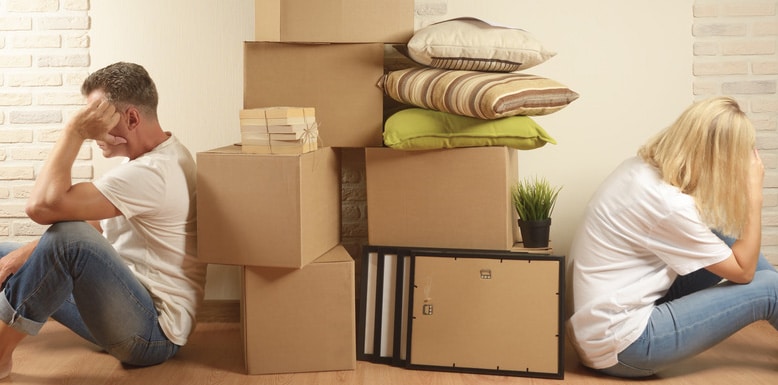Dealing With House Moving Stress
Moving is probably one of the most overwhelming events in your life. While most of the time moving will be deliberate, sometimes it will be out of necessity. Either way, you will have to deal with the physical and emotional house moving stress that will follow. Some people will experience moving house stress from the moment a decision is made to when the boxes are unpacked in the new house, regardless of how long the whole process takes. The stress and anxiety you may feel before you unpack the first box in the new home is quite normal.
However, following these suggestions and tips will help you and your loved ones in coping with stress and anxiety when moving house.
Before the Move
Dispose of Excess Stuff
Moving stress can be increased when there’s unnecessary clutter crowding your world. When you ditch this excess clutter, moving should be a lot more relaxed with the lightened load.
A suggestion would be to divide your stuff into four groups just before packing – sell, donate, toss and keep. You’ll probably find that the items to keep will make life easier when moving than trying to take absolutely everything with you. In any case, you can use any earnings from the sold items to help your moving expenses.
Check Your Finances
It is important you get your finances right before you move. Ensuring you have household insurance will give you piece of mind and save you from unnecessary stress when you get to your new home.
If you own your previous/current house and haven’t sold it yet, consider getting your house ready for sale early to avoid a rush and excess stress.
Have a Clear Plan
It’s essential that you know what you want to take to the new place and why you want it there – it’ll make unpacking feel more productive and liberating. For this, you should create a packing plan.
The packing plan should include ensuring you’ve got enough boxes way ahead of time (which will give you much more time to start the packing – make sure you don’t pack the stuff you use frequently too early though, you may need it before moving day).
A good way to label your boxes is by room – eg. Bathroom, Main Bedroom, Kitchen, etc.
This will make it much easier to group the boxes in the right parts of the new house.
Write a Check List
Packing your boxes will likely not be the only task you’ll need to manage when moving so writing a checklist that prioritises tasks from the most to the least important will help you ease your nerves by keeping your tasks in check (in your head and on paper).
Also, include the move-in date and rent requirements (if any) for both houses. Using a checklist will also help ensure that every task is done.
During the Move
Ask For Help
Don’t take on all the tasks alone. Assign your friends and family members specific responsibilities – they should be happy to help. If you’re unable to organise friends or family members to help, don’t shy away from hiring help if it’s in your budget.
Do Not Ignore Your Emotions
If your reason for moving is out of necessity, attend your emotional needs. Most people will be looking forward to moving with feelings of sadness and anxiety under this situation. Should you feel emotional, do not ignore these feelings, ride on them entirely.
Involve Your Children
If you have children, don’t underestimate the help they can offer, Assign them tasks such as packing items in their rooms. If they aren’t old enough, ask them to clean up a few things or help you toss away the things you do not need.
Older children also suffer moving house stress and anxiety – encourage them to express their feelings and make them understand why you have to move. Try to turn the whole experience into an exciting adventure for them so they actually look forward to it.
Stick To Your Routine
During the pre and post moving days, many people lose sleep and appetite. It’s recommended that you try and maintain your normal day schedule before the actual moving day. The routine should include getting enough sleep to help you with your house moving nerves. Planning your move ahead will help you get enough sleep. Also, avoid packing at night.
After the Move
Develop New Habits
Some people are known to begin new and healthier habits when they get in to their new home. Obviously, it’s recommended to choose a habit that’s good for the body and mind. Adopt the habit you have always wanted such as healthy meals and/or regular exercising.
Don’t be too drastic for starters, you’re more likely to stick to a plan if you work on it over time as opposed to going to extremes too quickly.
Stay in Contact with Friends
Contacting your old friends may be a great way to ease stress from the house move. You may see them less frequently if you’ve moved further away, but make sure you keep in touch – a friendly voice is one of the best things to help soothe away those moving day jitters.
